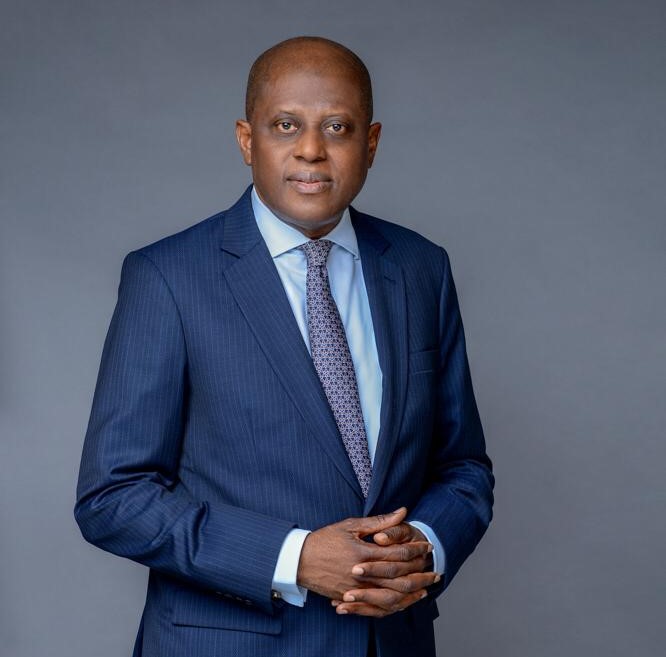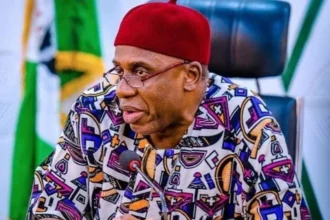...To get all news updates, Join our WhatsApp Group (Click Here)
Also Join our WhatsApp Channel (Click Here)
We all have secrets.
Something only you or maybe a few people know. I have a closely guarded secret; one that often elicits surprise whenever I share.
I don’t watch football. Yes. All ye football fans, please forgive me. I don’t watch because think football is over-rated and the margins of error are too many. Eleven men is a lot to control and harness their skills yet coaches make it work. But I try to follow the game. I follow the players, I know the scores, I take note of the stats and I often marvel when I see grown men become depressed when their favourite team loses.
And so, here I am borrowing a football metaphor to look at the work Olayemi Cardoso, Governor of the Central Bank of Nigeria (CBN) is doing at the apex bank.
Football is, at its core, about strategy; about identifying your opponents’ strengths and weaknesses and aiming at the Achilles’ heel of the opposition. It is a game in which resilience and perseverance can make the difference because a team, which, for instance, is at the top of the league table in September, could tire out by February and be nowhere near the top by April.
My profound apologies to Manchester City fans!
Football is akin to an orchestra with the coach as the conductor whose every wave of the arm is like a talisman of hope and opportunity. That is something every leader comes to learn on the job or as they prepare for the job.
The coach can, in that sense, make or mar a team which is also why a coach is allowed wide latitude to buy and sell players to make his vision come true, the way a CEO is allowed to choose a team to make sure his strategy for his organization is realised.
When Yemi Cardoso was appointed CBN governor, there was a shuffling of the deck and this led to the appointment of new deputy governors as well as sundry advisers and consultants.
Who are they and what do they bring to the table? First, the head coach. What are his bonafides?
Yemi Cardoso spent over 29 years in commercial banking, culminating in his tenure as Chairman of Citibank Nigeria Ltd, from 2010 to 2022. He had previously served as Executive Director at the Citizens International Bank Limited and Principal Partner at FBC Associates Limited from 1997 to 1999.
His public service credentials are no less stellar. Olayemi Cardoso was Commissioner for Economic Planning and Budget in Lagos State from 1999 to 2005. Reform minded, he implemented the blueprint which catalysed economic development in the state with Lagos emerging as the leader in IGR.
He graduated in 1980 with a Bachelor of Science degree in Managerial and Administrative Studies (with concentration in Finance and Accounting) from the Aston University in Birmingham, United Kingdom and subsequently obtained a Master’s degree in public administration and Management from Harvard University, Massachusetts in 2005 with (Concentration in Economics and Finance).
A Fellow of the Chartered Institute of Stockbrokers, he was conferred with a Doctorate in Business Administration (DBA) (Honoris Causa) by the Aston University in 2017 in recognition of his outstanding achievements in the private and public sectors.
Dr. Bala M. Bello is Deputy Governor, Operations Directorate. Bello was the Executive Director (Corporate Services) of Nigerian Export – Import Bank. A certified strategic management performance system professional, Bala holds a Stanford Graduate School of Management Certificate in Leading Change and Organizational Renewal (LCOR).
Bala who holds a Bachelor of Science Degree in Accounting and an MBA from the Ahmadu Bello University, Zaria, commenced his banking career with Guaranty Trust Bank Plc before joining the Securities and Exchange Commission (SEC). He received commendations for outstanding performance at both organisations.
Conferred with a Doctor of Business Administration (Honoris Causa) by Commonwealth University in conjunction with London Graduate School and Doctor of Philosophy (Honoris Causa) in Leadership and Management by ESAE University, Republic of Benin, Bala was the first indigenous Executive Director/Chief Operating Officer of Sigma Pensions and Executive Director (Operations). In that capacity, he had direct administrative oversight and managerial responsibility of over $1.5 billion of pension funds/assets under management (A-U-M), Budget preparations and other financial activities of the Company.
Mr. Muhammad Sani Abdullahi is Deputy Governor Economic Policy Directorate. A former Commissioner for Economic Planning and Budget for over five years, Abdullahi is a development economist versed in economic policy formulation. He was a member of the World Bank Expert Advisory Council, a Policy Adviser at the Executive Office of former UN Secretary-General Ban Ki-Moon in New York, and Senior Economist at the Office of the Senior Special Assistant to the President on Millennium Development Goals (MDGs) – United Nations Development Programme (UNDP) where he assisted in the management of the Conditional Grants Scheme.
Sani Abduallhi graduated from Ahmadu Bello University, Zaria, in 2002 with a Bachelor of Science (BSc.) Honours degree in Economics. He obtained a Master of Science (M.Sc) in Development Economics and Policy from the University of Manchester, United Kingdom, and a Master’s Degree in International Relations from Ahmadu Bello University, Zaria, in 2009 and 2007 respectively.
Mr. Philip Ikeazo is Deputy Governor, Financial System Stability Directorate. A banker and chartered accountant, his 33 years banking career has seen him lead as the Managing Director/CEO of Keystone Bank Limited; Managing Director/CEO, Ecobank Kenya Limited; Executive Director, Union Bank Nigeria Plc; Director, Union Bank, United Kingdom; and Director Orient Bank, Uganda. He also served at various times at the United Bank for Africa Plc, as the General Manager, in charge of Corporate Investment Banking and the Director of Wholesale Banking
A Fellow of the Institute of Chartered Accountants of Nigeria, the Chartered Institute of Bankers of Nigeria and the Chartered Institute of Taxation of Nigeria, Ikeazor holds a degree in Economics from the University of Buckingham, United Kingdom and is also an alumnus of the Wharton CEIBS-IESE Business School Global CEO programme.
Ms. Emem Usoro is Deputy Governor, Corporate Services Directorate. Emem is a Fellow of the Chartered Institute of Bankers of Nigeria (CIBN).
In her over two decades banking career she led in roles as Executive Director, North Bank, in the United Bank for Africa (UBA) where she championed sales strategies and executive management initiatives in seven regional banks and 151 branches across the Northern directorate and as regional executive at Bank PHB Plc (now Keystone Bank), in charge of developing commercial businesses and overseeing 32 branches.
An alumna of the Harvard Business School and Lagos Business School, Usoro holds a Bachelor of Science (B.Sc.) in Biochemistry from the University of Uyo, and a Masters in Business Administration (MBA) from Obafemi Awolowo University, Ile-Ife, in 2000.
And now we return again to football.
At the height of Ruben Amorim’s recent falling out with Marcus Rashford at Manchester United, the gaffer was so incensed he said he would rather play a 63 year old assistant coach than play the center-forward. An extreme case, I know but sometimes, a coach has to look outside the core team for the help he needs and that is where advisers and consultants come into the picture.
Ms. Shola Phillips is the Special Adviser to the Governor on Compliance & Risk. A compliance expert with over 25 years’ experience across the wholesale and retail sectors of the financial service industry, Ms. Phillip’s regulatory knowledge spans multiple jurisdictions, including the United Kingdom, Europe, United Arab Emirates, Hong-Kong, Singapore, Japan, United States of America, and Africa
Shola Phillips who has a degree in Economics from the University of Reading in England and an M.B.A. from Cardiff Business School in Wales was most recently the Global Head of Compliance for Risk Management at Citigroup, Inc and is currently leading the design and implementation of a new department with the mandate to improve compliance within the CBN and across the Nigerian Banking industry by fostering good governance and ethical conduct via the introduction of accountability measures.
Mr. Mayokun Ajibade is Special Adviser (Financial Markets and Economic Policy). A former Managing Director for Standard Chartered Bank in West and Southern Africa, he led the treasury and financial markets business across 14 countries.
Mayo has over 25 years of experience in building and leading businesses with a thorough understanding of markets across Africa, having been involved in policy advisory and the execution of transactions that cut across origination, structured solutions, and market infrastructure development. He is a key part of the regulatory reform efforts of the Nigeria financial markets and advises on policy and operational changes required for the transition to an orthodox monetary policy environment.
Fatai Karim is Special Adviser to the Governor with a focus on promoting growth, introducing international best practices, and providing guidance through evidence-based recommendations.
Karim’s extensive international experience is critical to driving growth, offering expert guidance on operational, technological, and risk policy matters while supporting effective monetary policy and regulation, ultimately fostering economic and financial stability.
His 32 years of experience has seen him hold leadership and management positions at Citibank Nigeria Limited, Citibank Niamey, Citibank Tanzania, Citibank Uganda, Citibank South Africa, and Citibank London.
Tony Ogufere is a Special Adviser to the Governor with a focus on ensuring the Bank’s alignment with its core mandates: monetary policies, price stability, and advisory services.
A finance and strategy expert, Ogufere is adept at formulating policies and programs to support fiscal investments and economic growth and in this role ensures that the CBN does not directly intervene in financing economic activity.
A Fellow of the Institute of Chartered Accountants of Nigeria, Tony holds an MBA from Columbia University, New York (Uris Hall) and is a member of the Bank’s Monetary Policy Technical Committee. He has executed transactions across several industry verticals, including Fintech, Oil & Gas, Renewable Energy, and Real Estate development.
Dr. Daphne Oterie Dafinone is a Consultant/Adviser to the CBN Governor on development finance and governance matters and her over 35 years of experience spans corporate governance, due diligence, corporate restructuring, mergers and acquisitions, reverse-takeovers, debt restructuring etc. She was formerly audit committee chair on the board of CitiBank Nigeria.
A Fellow of the Institute of Chartered Accountants in England & Wales and the Institute of Chartered Accountants of Nigeria, she started her career at KPMG Peat Marwic MCClintock Chartered Accountants in United Kingdom and began consulting for the CBN from her role as Chief Operating Officer of Crowe Dafinone.
Terri Dafinone graduated with a BA (Hons) Economics degree from the University of Manchester in 1987 and obtained an MSc Internal Audit & Management Finance from City University, London in 1996 before bagging a PhD Internal Audit & Corporate Governance in 2001 from the same institution.
Dr. Nkiru Balonwu is a Consultant/Adviser to the CBN Governor with a focus on Stakeholder Engagement, Strategic Communications, Legal and high impact projects. A former CEO of Spinlet, Africa’s pioneer music streaming app, Balonwu is Founder of The Africa Soft Power Group, which includes the Africa Soft Power Project, ASP Global, and African Women on Board.
A globally recognized strategist and consultant, Dr. Balonwu has over 25 years cognate experience and holds a doctorate from the University of California, Berkeley; a Master’s degree from University College London; a law degree from the University of Manchester; and has been called to the bar in England, Nigeria, and New York. She was the inaugural Lecturer of Gender & Law at the University of Lagos, a Senior Fellow from 2022-2023 at the Mossavar-Rahmani Center for Business and Government, Harvard Kennedy School, and in 2019, she received the Powerlist UK Black Excellence International award in recognition of her innovative work with African Women on Board before being listed in 2022 among New African magazine’s Top 100 Most Influential Africans.
And there we have it; the coach, Yemi Cardoso and his “first eleven” who are assisting him with implementing the reform agenda at the CBN.
Toni Kan is a PR expert, financial analyst and biographer.
You can get every of our news as soon as they drop on WhatsApp ...To get all news updates, Join our WhatsApp Group (Click Here)
Also Join our WhatsApp Channel (Click Here)











